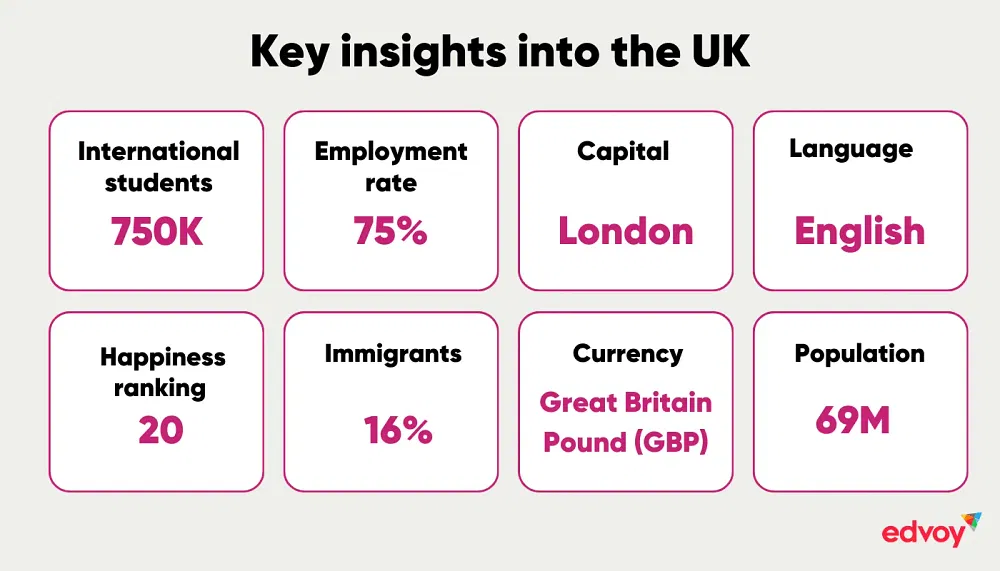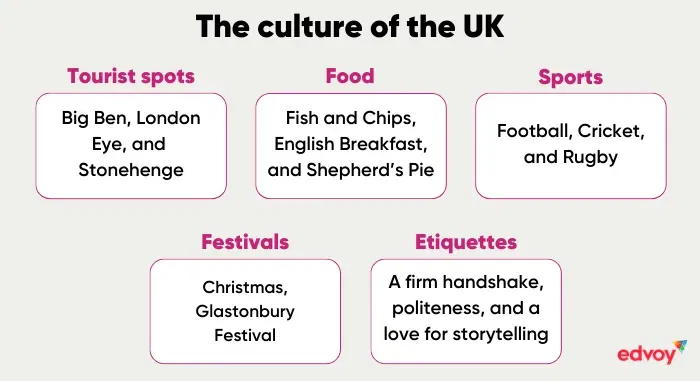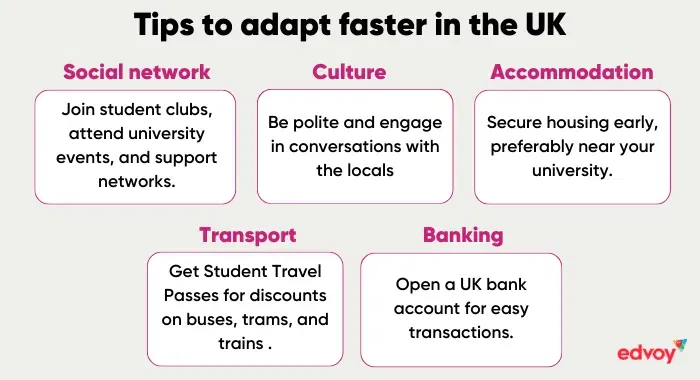The UK is a really popular choice for students from all over the world. Known for its top universities and strong academic reputation, the UK is one of the best places to study.
A big reason students are drawn to the UK is the world-famous universities that offer high-quality education. On top of that, the UK lifestyle is incredibly diverse and welcoming, so you can meet people from all over the globe while enjoying a lively, exciting student experience.

Get a complete guide to studying in the UK.
Moving to the UK for your studies is a big step. If you’re curious about student life in the UK for international students, you may have a lot of questions about how things work. Don’t worry, our experts have broken it down for you. Just click on the topics that interest you and find all the key information you need.
| Employment opportunities in the UK | Cost of living in the UK |
| Education system in the UK | Best courses in the UK |
| Student visa in the UK | Best universities in the UK |
Student life in the UK offers a great balance of academic focus and personal growth, especially for international students. From the moment you arrive, you'll find plenty of support, whether it’s through university services, student unions, or local communities.
The UK education system encourages independent thinking and creativity, which helps you build confidence and critical skills. Outside of studies, there’s always something happening, like clubs, societies, cultural events, and travel opportunities.
Whether you're joining student societies, attending cultural festivals, or simply enjoying everyday life in a new city, the UK gives you the perfect environment to grow and connect.
Find the right university in the UK today!
Discover the culture of the UK
The UK is a country full of history, tradition, and modern life. It’s made up of four parts: England, Scotland, Wales, and Northern Ireland. The country is located just off the coast of Europe. Each part of the country has its own special customs, accents, and way of life, which makes living and studying here really interesting.
One of the best things about the UK is how diverse it is. It’s known for things like afternoon tea, famous music, football, and beautiful old buildings. People in the UK mostly speak English, but you might also hear other languages like Welsh or Scots Gaelic, especially in certain areas. Plus, you’ll meet people from all over the world, and different cultures are celebrated everywhere.
Let’s take a closer look at what makes the UK lifestyle and culture so unique and exciting!

Food and traditions
Starting with food, the UK has a rich food culture with many traditional dishes to try. Some of the most popular include fish and chips, Sunday roast with gravy, shepherd’s pie, and a full English breakfast.
But don’t worry if you’re not used to British food. There are plenty of options from around the world. In most cities, you’ll find Indian, Chinese, Italian, Middle Eastern, African, and many other types of food.
Supermarkets also carry ingredients from all over the world, so you can cook meals from home if you like. Big cities like London, Manchester, and Birmingham are especially known for their food diversity.
Important festivals
Not just food, the UK celebrates a mix of traditional, cultural, and religious festivals throughout the year. One of the biggest is Christmas, celebrated on 25th December. Homes and streets are decorated with lights, people exchange gifts, and families enjoy a special meal, usually with roast turkey and Christmas pudding.
In the lead-up to Christmas, cities host festive markets and events. Easter is another important Christian festival, usually in March or April, marked by church services, Easter egg hunts, and chocolate treats. Another major event is New Year’s Eve on 31st December, with fireworks and parties to welcome the new year at midnight.
There are also cultural celebrations like Notting Hill Carnival in August, which celebrates Caribbean culture with music, food, and colourful parades in London. Additionally, in cities across the UK, you can also celebrate Diwali, Eid, Chinese New Year, and Pride festivals, reflecting the country’s diversity.
Etiquette
Regarding etiquette in the UK, politeness and good manners are highly valued, and using simple words like "please," "thank you," and "sorry" goes a long way in everyday conversations. Whether you're talking to a lecturer, classmate, or stranger, being respectful and courteous is important.
When meeting someone for the first time, a firm handshake is common, especially in formal settings. Punctuality is also expected, like arriving on time for classes, appointments, or social events, which shows respect for others’ time. While being a few minutes late to casual meetups is often accepted, it’s best to inform the person if you’re running behind.
If you’re invited to someone’s home, bringing a small gift like chocolates, flowers, or a dessert is a kind gesture. Also, avoid overly personal or sensitive topics.
Travel
The UK is full of amazing places to visit! London is a top tourist spot, with famous sights like Big Ben, Buckingham Palace, the London Eye, and Tower Bridge. Up north, Edinburgh in Scotland is known for its historic castle and beautiful old town. If you love nature, head to the Lake District or the Scottish Highlands for stunning landscapes.
Getting around is pretty easy. Trains are a popular choice because they’re fast, comfy, and great for seeing the countryside as you go. In London, the Underground (or the "Tube") is the quickest way to get around. Plus, you’ll see those red double-decker buses everywhere.
Other cities like Manchester and Edinburgh have trams. Buses are a good option too, especially for smaller towns. Whether you're after city sights or countryside views, public transport makes exploring the UK so easy.
Healthcare
Healthcare in the UK is mostly provided by the National Health Service, or NHS for short. It’s a publicly funded system, which means most services are free to use. If you're living in the UK as a student, you’ll likely have access to NHS healthcare, especially if you’re studying for more than six months.
When you arrive, it's a good idea to register with a local doctor, also known as a General Practitioner (GP). GPs are your first stop for most health issues. If you need more specialised care, they’ll refer you to a hospital or specialist. There are also walk-in centres and NHS 111, a free phone service for non-emergency advice.
If you're an international student, you may need to pay the immigration health surcharge when applying for your visa. Once that’s done, you can use the NHS just like a UK resident. Plus, many universities have on-campus medical facilities, making it easy for you to get basic care.
Also read: Top 10 reasons to study in the UK
Make the most out of your student life
Being an international student is an exciting adventure. This means a new country, new friends, and tons of opportunities to grow. But it can also come with challenges, from settling in to managing studies and exploring your surroundings. Let’s delve a bit deeper into student life.
Part-time jobs in the UK
Many international students in the UK take up part-time jobs alongside their studies. It’s a great way to earn extra money, gain experience, and meet new people. Always check your visa details to be sure. To work, you’ll need a National Insurance (NI) number, which you can apply for online. You may also need a UK bank account for your pay.
| Aspect | Details |
|---|---|
| Work eligibility | Students on a Student visa can work part-time while studying. |
| Working hours | Up to 20 hours/week during term time, full-time during holidays. |
| Work permit | Not required for part-time or casual jobs under visa conditions. |
| Documentation | A National Insurance (NI) number, a UK bank account, and a valid visa are required. |
Related article: Your step-by-step guide to finding an internship abroad
Student accommodation in the UK
Whether you prefer a quiet space or a lively shared flat, there’s something to suit every budget and lifestyle. You can find various types of accommodation in Ireland, including on-campus housing, private rentals, and homestays.
Many universities offer specialised student accommodation too. Additionally, student housing services and online platforms help locate affordable and suitable living options.
| Accommodation type | Description | Average monthly cost |
|---|---|---|
| On-campus housing | These are university-managed student dorms, usually close to campus. | GBP 500 – 900 |
| Private rentals | Apartments or shared houses. It might require you to sign a lease agreement. | GBP 400 – 1,000 |
| Homestay | Living with local UK families, where they’ll provide you with meals and utilities. | GBP 600 – 900 |
| Student hostels | Budget-friendly, temporary stay option, which is ideal while searching for long-term housing. | GBP 300 – 600 |
Tips to settle down faster
Moving to a new country can feel a bit scary at first, but don’t worry. With an open mind and a little time, you’ll settle in just fine. The UK is welcoming, and there are lots of students just like you, figuring things out too.
A good way to feel at home is to join student clubs or events, because it’s an easy way to make friends. Explore your new city, try local food, and don’t be shy to ask questions. People are usually happy to help.
Plus, keep your important documents safe, set up your phone and bank account early, and give yourself time to adjust. Staying in touch with friends and family back home can also help when you’re feeling homesick.

Student life in the UK is exciting, diverse, and full of opportunities. From exploring historic cities and beautiful countryside to joining uni clubs and meeting people from all over the world, there’s always something going on.
You can work part-time, enjoy student discounts on travel, and get support through services like the NHS. Accommodation options are flexible, whether you prefer campus halls or private rentals. Settling in might take a little time, but eventually, it becomes a fun adventure.
Looking to study in the UK? We have numerous partner universities in the UK offering a range of courses for you to choose from.
We’re a global technology-driven admissions platform offering study-abroad solutions to students across the world. Our AI-powered app simplifies the course search, application process, and enrollment in international universities. With 18+ years of experience, we’ve helped 100K+ students from over 65 countries to pursue their study-abroad dreams. You could be next!
Let our counsellors clear all your concerns and help you realise your dream towards becoming an international student.
Start your study-abroad journey today!
Frequently asked questions
What’s the weather like in the UK? Do I need to pack anything special?
The UK weather can be a bit unpredictable. It might be sunny one minute and rainy the next. You’ll definitely need a waterproof jacket, some warm layers, and comfy shoes. Don’t worry, you’ll get used to it quickly.
How do I open a bank account in the UK as a student?
Once you arrive in the UK, you’ll need to book an appointment at a bank and bring your passport, visa, proof of address, and a letter from your university. Most banks offer special student accounts with no fees.
Is it easy to make friends as an international student?
Yes! UK campuses are super diverse, and most students are open to meeting new people. Events like orientation week, group projects, clubs, and even your flatmates are great ways to start making friends.
What if I have trouble understanding the UK accent?
There are lots of accents across the UK, and it might take a little time to adjust. Most people speak clearly, and if you ever need someone to repeat something, just ask and they’ll understand.
Can I travel to other countries while studying in the UK?
Yes! Once you have your UK student visa, you can travel across the UK and even to Europe during holidays. Before that, just make sure your visa allows re-entry into the UK and check any travel restrictions before you go.